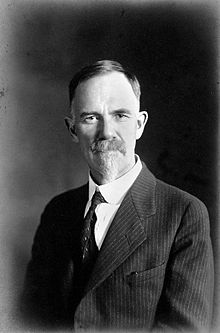Charles Benedict Davenport
| Charles Davenport | |
|---|---|

Charles Benedict Davenport, ca. 1929.
|
|
| Born |
June 1, 1866 Stamford, Connecticut |
| Died | February 18, 1944 (aged 77) Cold Spring Harbor |
| Nationality | American |
| Fields | Eugenicist and biologist |
| Institutions | Cold Spring Harbor Laboratory |
| Alma mater | Harvard University |
| Spouse | Gertrude C. Davenport |
| Children | Millia Crotty, Jane Joralemon, Charles Benedict, Jr. |
Charles Benedict Davenport (June 1, 1866 – February 18, 1944) was a prominent American eugenicist and biologist. He was one of the leaders of the American eugenics movement.
Davenport was born in Stamford, Connecticut, to Amzi Benedict Davenport, an abolitionist of Puritan stock, and his wife Jane Joralemon Dimon (of English, Dutch and Italian ancestry). His mother’s strong beliefs tended to rub off onto Charles and he followed the example of his mother. During the summer months, Charles and his family lived in Brooklyn due to his father’s job. Due to Davenport's father's strong belief in Protestantism, as a young boy Charles was tutored at home. This came about in order for Charles to learn the values of hard work and education. When he was not studying, Charles worked as a janitor and errand boy for his father's business. He attended Harvard University, earning a Ph.D in biology in 1892 and married Gertrude Crotty, a zoology graduate, in 1894.
Later on, Davenport became a professor of zoology at Harvard. He became one of the most prominent American biologists of his time, pioneering new quantitative standards of taxonomy. Davenport had a tremendous respect for the biometric approach to evolution pioneered by Francis Galton and Karl Pearson, and was involved in Pearson's journal, Biometrika. However, after the re-discovery of Gregor Mendel's laws of heredity, he moved on to become a prominent supporter of Mendelian inheritance.
...
Wikipedia
